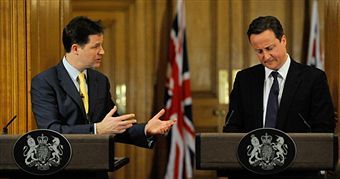 Mark Littlewood is Director General of the Institute of Economic Affairs and
contributed an article to the recent collection Big Brother Watch: The state of civil liberties in
Britain. He summarises his argument here.
Mark Littlewood is Director General of the Institute of Economic Affairs and
contributed an article to the recent collection Big Brother Watch: The state of civil liberties in
Britain. He summarises his argument here.
It’s not fanciful to argue that the formation of a Liberal-Conservative coalition government last May was helped by the fact that Lib Dem and Tory parliamentarians had worked closely together in the previous Parliament to thwart or temper some of the Labour administration’s more aggressive assaults on civil liberties.
The two parties – then in opposition, now in government – seemed to find common ground in defending the rights of the individual against the increasingly shrill demands of the agencies charged with upholding our safety and security. Whether it was the introduction of national identity cards, and the gargantuan accompanying database, or three months detention without trial for terror suspects, Cameron’s and Clegg’s parliamentary troops seemed conjoined in civil libertarianism.
But has entering government changed them? We have seen in the past how politicians can change in government. Back in 1994, Michael Howard, then Home Secretary, proclaimed the merits of ID cards.
Labour railed against the plans. But seven years later – in the wake of the 9/11 outrage – senior Labour figures, by then in government, found merit in the proposals.
In fairness to the coalition, they have not embraced a slew of populist draconian policies upon assuming office. The response to the Whitehaven shootings was not to insist upon yet more firearms
legislation – the “something must be done” impulse was resisted.
But cracks have started to appear. Control orders, which seemed to be considered wrong in principle before the election, now present a “dilemma” where “the balance needs to be got right”, according to the Deputy Prime Minister.
Nick Clegg was also initially committed to a wide-ranging Freedom Bill. The claims made for this legislation were grand indeed – Clegg suggested it would amount to the greatest act of reform since 1832 “Be demanding about your liberties, be insistent about your rights,” the Deputy Prime Minister implored us in July. “This is about your freedom and this is your chance to have your say.”
Three months later, overwhelmed by the complexity and detail of many suggestions, the project was transferred to the Home Office. Douglas Carswell has already written of how little progress is being made.
In areas of lifestyle choice, the coalition shows worrying signs of perpetuating the nannying so beloved of the last administration. We can’t actually be trusted to make our own decisions about alcohol consumption – and be held responsible for these decisions. Selling alcohol at below cost price may be prohibited (although I doubt free drinks receptions at party conferences will be banned). The government is also concerned about protecting children from “excessive commercialisation” and may take the ludicrous step of restricting sales of items of clothing considered too sexually provocative.
There are liberal instincts at the heart of this government, but they often seem to be struggling to express themselves. As coalition ministers become more and more weighed down by striking the right “balances”, the danger is that civil liberties might be eroded still further.






Comments